人教版英语九年级上册课文讲解
- 格式:pptx
- 大小:3.88 MB
- 文档页数:45
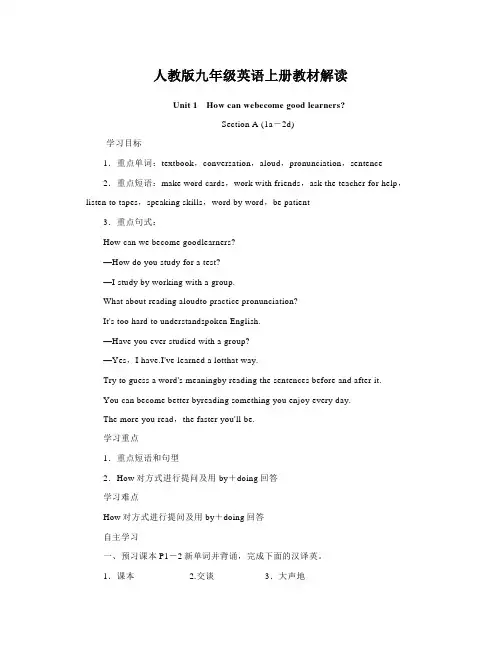
人教版九年级英语上册教材解读Unit 1How can webecome good learners?Section A (1a-2d)学习目标1.重点单词:textbook,conversation,aloud,pronunciation,sentence2.重点短语:make word cards,work with friends,ask the teacher for help,listen to tapes,speaking skills,word by word,be patient3.重点句式:How can we become goodlearners?—How do you study for a test?—I study by working with a group.What about reading aloudto practice pronunciation?It's too hard to understandspoken English.—Have you ever studied with a group?—Yes,I have.I've learned a lotthat way.Try to guess a word's meaningby reading the sentences before and after it.You can become better byreading something you enjoy every day.The more you read,the faster you'll be.学习重点1.重点短语和句型2.How对方式进行提问及用by+doing回答学习难点How对方式进行提问及用by+doing回答自主学习一、预习课本P1-2新单词并背诵,完成下面的汉译英。
1.课本________ 2.交谈_________3.大声地__________4.发音(n.)_________5.句子_________ 6.有耐心的________二、认真预习1a-2d找出下列短语和句型。
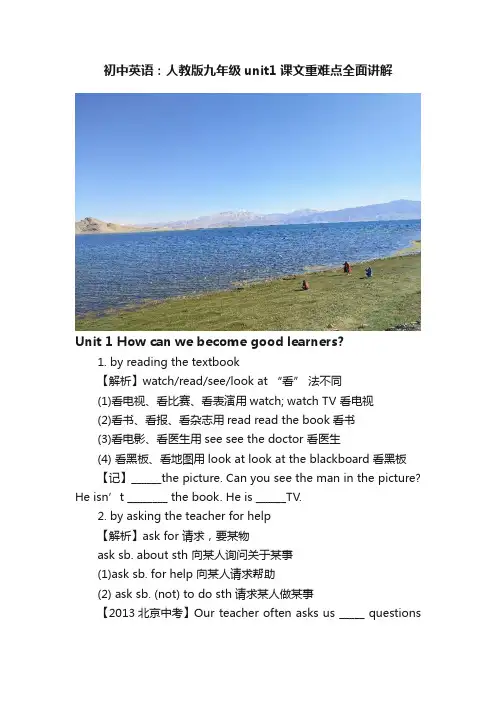
初中英语:人教版九年级unit1课文重难点全面讲解Unit 1 How can we become good learners?1. by reading the textbook【解析】watch/read/see/look at “看” 法不同(1)看电视、看比赛、看表演用watch; watch TV 看电视(2)看书、看报、看杂志用read read the book看书(3)看电影、看医生用see see the doctor 看医生(4) 看黑板、看地图用look at look at the blackboard 看黑板【记】______the picture. Can you see the man in the picture? He isn’t ________ the book. He is ______TV.2. by asking the teacher for help【解析】ask for 请求,要某物ask sb. about sth 向某人询问关于某事(1)ask sb. for help 向某人请求帮助(2) ask sb. (not) to do sth请求某人做某事【2013北京中考】Our teacher often asks us _____ questionsin groups.A. discussB. to discussC. discussingD. discussed3.I study by working with a group. 我通过小组学习。
【解析】by/with/in/on “用” 法不同◆by的用法:(1)by doing sth 通过…方式 by studying with a group【注】介词短语作方式状语,回答以How开头的问句,表示“怎样做”。
①I study English by ___________(listen) to the tapes②Tom learns Chinese by ____________(watch) Chinese movies.③ -- ____ did you get there? — By ___ a taxi.A. How; takingB. How ; takeC. How; tookD. What; taking(2) by+ 交通工具(交通工具前不能加限定词) by bike by train【by短语】by the way 顺便问一下by accident= by chance 偶然地by mistake 错误地one by one 一个接一个 step by step 一步一步地 little by little 逐渐地by the time 到……为止 by oneself 独自地by and by 不久之后 by hand 用手 by the end of 到….... 末尾◆with 的用法:表示用某种工具(1) with +工具 We like to write with a pen.(2)with+人体部位 We see with our eyes.◆in 的用法:通常与“衣着、声音、书写材料”等名称连用in+语言 in English 用英语 speak in a soft voice◆on 的用法: on +电器或媒介 on TV /radio/Internet( ) The boy was cutting a branch of a tree ____ a knife.A. inB. byC. withD. use4. Do you learn English by watching videos?【解析】learn →learned/learnt→learned/learnt v 学习learn about 了解(1) learn from sb. 向某人学习(2) learn to do sth 学着做某事(3)learn …by oneself= teach oneself 自学①We should _________ ________ the hard- working students.(向……学习)5.. What about reading aloud topractice pronunciation?【解析1】用于提建议的句型有:(1)What about doing sth ?=How about doing sth? ….怎么样?(2)Why don’t you do s th?= Why not do sth? 为什么不呢?(3)Let’s do sth.让我们一起做某事吧。
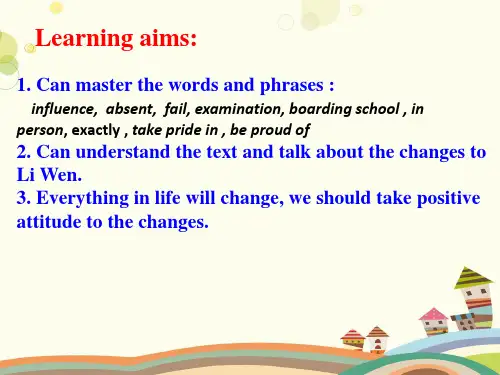
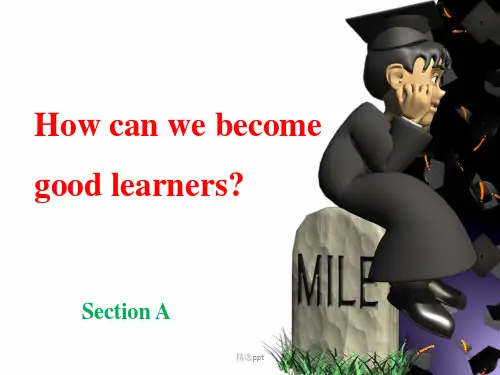
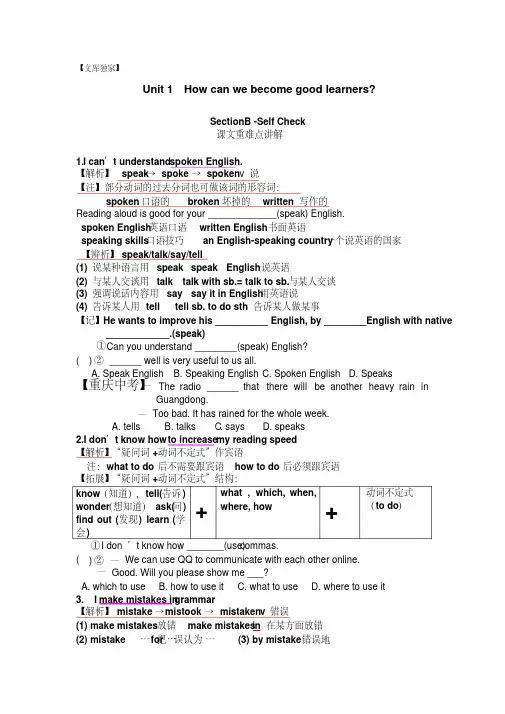
【文库独家】Unit 1 How can we become good learners?SectionB -Self Check课文重难点讲解1.I can’t understand spoken English.【解析】speak→spoke →spoken v说【注】部分动词的过去分词也可做该词的形容词:spoken 口语的broken 坏掉的written 写作的Reading aloud is good for your _____________(speak) English.spoken English 英语口语written English 书面英语speaking skills 口语技巧an English-speaking country 一个说英语的国家【辨析】speak/talk/say/tell(1) 说某种语言用speak speak English 说英语(2) 与某人交谈用talk talk with sb.= talk to sb. 与某人交谈(3) 强调说话内容用say say it in English 用英语说(4) 告诉某人用tell tell sb. to do sth 告诉某人做某事【记】He wants to improve his __________ English, by ________English with native ____________.(speak)①Can you understand ________(speak) English?( )②______ well is very useful to us all.A. Speak EnglishB. Speaking EnglishC. Spoken EnglishD. Speaks【重庆中考】—The radio ______ that there will be another heavy rain inGuangdong.—Too bad. It has rained for the whole week.A. tellsB. talksC. saysD. speaks2.I don’t know how to increase my reading speed【解析】“疑问词+动词不定式”作宾语注:what to do 后不需要跟宾语how to do 后必须跟宾语【拓展】“疑问词+动词不定式”结构:know(知道),tell(告诉)wonder(想知道)ask(问) find out (发现) learn (学会) +what , which, when,where, how +动词不定式(to do)①I don’t know how _______(use) commas.( )②—We can use QQ to communicate with each other online.—Good. Will you please show me ___?A. which to useB. how to use itC. what to useD. where to use it3. I make mistakes in grammar【解析】mistake→mistook →mistaken v错误(1) make mistakes 放错make mistakes in在某方面放错(2) mistake …for… 把…误认为… (3) by mistake 错误地。
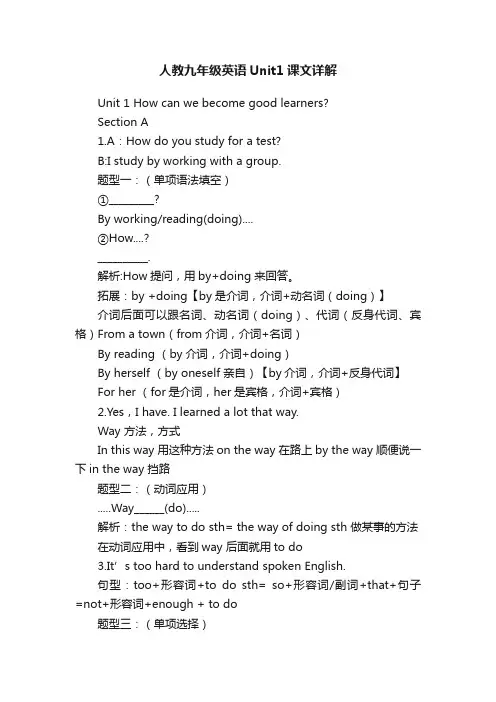
人教九年级英语Unit1课文详解Unit 1 How can we become good learners?Section A1.A:How do you study for a test?B:I study by working with a group.题型一:(单项语法填空)①_________?By working/reading(doing)....②How....?__________.解析:How提问,用by+doing 来回答。
拓展:by +doing【by是介词,介词+动名词(doing)】介词后面可以跟名词、动名词(doing)、代词(反身代词、宾格)From a town(from介词,介词+名词)By reading (by介词,介词+doing)By herself (by oneself 亲自)【by介词,介词+反身代词】For her (for是介词,her是宾格,介词+宾格)2.Yes,I have. I learned a lot that way.Way 方法,方式In this way 用这种方法on the way 在路上by the way 顺便说一下in the way 挡路题型二:(动词应用).....Way______(do).....解析:the way to do sth= the way of doing sth 做某事的方法在动词应用中,看到way 后面就用to do3.It’s too hard to understand spoken English.句型:too+形容词+to do sth= so+形容词/副词+that+句子=not+形容词+enough + to do题型三:(单项选择)①It’s....____ 形容词_____ I do......解析:so+形容词/副词+that+句子②It’s ...____形容词_____ do......解析:too+形容词+to do sth4.Oh ,yes. It really improves my speaking skills.Speaking skill 口语的技巧No.It’s too hard to understand spoken English.Spoken English 英语口语题型四:(词性转换)①.......______(speak) skill.解析:speak 动词-- speaking 形容词口语的Speaking形容词+ Skill 名词(形容词修饰名词)②......______(speak) English.解析:speak 动词--spoken 形容词口语的Spoken 形容词+ English 名词(形容词修饰名词)5.Annie, I’m a little nervous.Little 几乎没有+不可数名词-- a little 一些+不可数名词-- less 更少的+不可数名词Few 几乎没有+可数名词--a few 一些+可数名词-- few 更少的+可数名词A little nervousA little+nervous(紧张的,形容词)→a little +形容词注意:a little, a bit,even, far,still,much6.I have to finish reading a book and give a report next Monday.Have to 不得不=have finish (reading)doing 完成做某事Give a report 作报告have a report 听报告题型五:(动词应用)....finish_____(do)...解析:finish doing sth 完成做某事7.That doesn't sound too bad.Sound(感官动词,听上去)bad(形容词)-- 感官动词+形容词Feel 感觉上taste 尝起来smell(闻起来)look(看起来)8.Just read quickly.Read 动词+quickly 副词(动词+副词)题型六:(词形转换)副词+动词.....do_____(quick).解析:quick 形容词,快速的-- quickly 副词,快速地(副词+动词)8.I’m a very slow reader.very 副词+slow 形容词+reader名词(副词+形容词,形容词+名词)题型七:(词性转换)副词+形容词①e.g comple te 形容词--completely 副词.....______(complete) happy......解析:happy 是形容词,副词+形容词②e.g happiness 名词happy 形容词happily 副词/doc/2a6748418.html,pletely______(happily)......解析: Completely 副词,副词+形容词题型八:(词形转换)形容词+名词..._____(use)sentences解析:sentences 句子,名词--形容词+名词Use 动词--useful 形容词9.Don't read word by word.Don’t 是助动词,助动词+动词原形10.Try to guess a word’s meaning by reading the sentences before and after it.Try 的用法:①try to do sth 尽力做某事②try doing sth 尝试做某事③try one's best 尽某人最大努力11.Well,be patient.Patient ①名词,病人②形容词,耐心的Be(be 动词)+patient (形容词)→be +形容词题型九:词性转换be+形容词....am/is/are/was/were_______(happily)解析:am/is/are/was/were是be 动词,be+形容词Happily 副词→happy 形容词....am/is/are/was/were_______(happy)解析:am/is/are/was/were是be 动词,be+形容词注意,如果括号里本身是形容词,就要把这个词变成相反词Happy→unhappy12.You can become better by reading something you enjoy every day. Enjoy 动词enjoyable 形容词固定搭配:enjoy doing sth 喜欢做某事13.The more you read ,the faster you’ll be.The+比较级,the+比较级题型十:词形转换+语法单项填空The_______......,the______......解析:The+比较级,the+比较级表示越...越...空格上应该填比较级,比较级的结构:①形容词+er②more+形容词14.Why did Wei Fen find it difficult to learn English?Find it+形容词+to do sth 发现做某事是......的题型十一:动词应用.....find/think/make it.....______(do).....It is+形容词........________(do)......It takes +时间/金钱+________(do)....解析:在动词应用中只要看到it,空格上就填不定式to do15.What is the secret to language learning?The secret to ... 做.... 的秘诀这里的to 是介词,介词后面跟名词、动名词(doing)、代词题型十二:动词应用+语法单项填空......the secret to______(do).....解析:①the secret to doing... 做某事的秘诀②空格上的词组the secret to 这里的to是介词,介词后跟名词、动名词(doing)、代词。
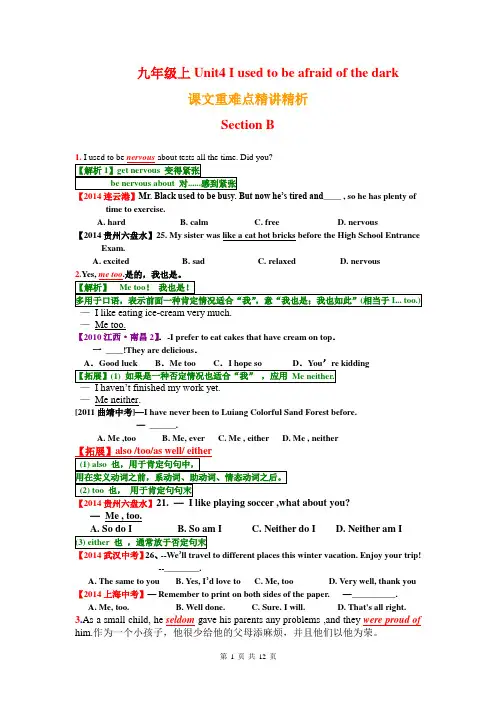
九年级上Unit4 I used to be afraid of the dark课文重难点精讲精析Section B1. I used to be nervous about tests all the time. Did you?【解析1】get nervous 变得紧张be nervous about 对......感到紧张【2014连云港】Mr. Black used to be busy. But now he’s tired and____ , so he has plenty of time to exercise.A. hardB. calmC. freeD. nervous【2014贵州六盘水】25. My sister was like a cat hot bricks before the High School Entrance Exam.A. excitedB. sadC. relaxedD. nervous2.Yes, me too.是的,我也是。
【解析】Me too!我也是!多用于口语,表示前面一种肯定情况适合“我”,意“我也是;我也如此”(相当于I... too.) —I like eating ice-cream very much.—Me too.【2010江西·南昌2】.-I prefer to eat cakes that have cream on top.一____!They are delicious.A.Good luck B.Me too C.I hope so D.You’re kidding【拓展】(1) 如果是一种否定情况也适合“我”,应用Me neither.—I haven’t finished my work yet.—Me neither.[2011曲靖中考]—I have never been to Luiang Colorful Sand Forest before.—______.A. Me ,tooB. Me, everC. Me , eitherD. Me , neither【拓展】also /too/as well/ either(1) also 也,用于肯定句句中,用在实义动词之前,系动词、助动词、情态动词之后。
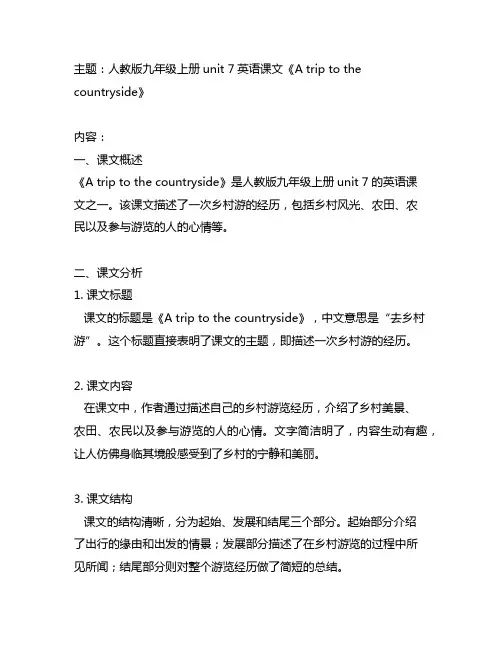
主题:人教版九年级上册unit 7英语课文《A trip to the countryside》内容:一、课文概述《A trip to the countryside》是人教版九年级上册unit 7的英语课文之一。
该课文描述了一次乡村游的经历,包括乡村风光、农田、农民以及参与游览的人的心情等。
二、课文分析1. 课文标题课文的标题是《A trip to the countryside》,中文意思是“去乡村游”。
这个标题直接表明了课文的主题,即描述一次乡村游的经历。
2. 课文内容在课文中,作者通过描述自己的乡村游览经历,介绍了乡村美景、农田、农民以及参与游览的人的心情。
文字简洁明了,内容生动有趣,让人仿佛身临其境般感受到了乡村的宁静和美丽。
3. 课文结构课文的结构清晰,分为起始、发展和结尾三个部分。
起始部分介绍了出行的缘由和出发的情景;发展部分描述了在乡村游览的过程中所见所闻;结尾部分则对整个游览经历做了简短的总结。
三、课文意义与价值《A trip to the countryside》这篇课文富有现实感和真实情感,让学生们领略到了乡村的魅力。
通过这篇课文,学生们也可以学习到一些有关乡村生活和自然风光的词汇和表达方式,丰富了他们的词汇量和语言表达能力。
四、课文教学建议针对《A trip to the countryside》这篇课文教学,教师可以结合实际情境,引导学生深入体验乡村的美丽风景和丰富文化,激发学生对乡村的兴趣和向往。
可以通过这篇课文,引导学生运用所学的语言知识,描述自己的一次旅行经历,提高他们的语言表达能力。
五、结语《A trip to the countryside》这篇课文生动有趣,内容丰富,适合作为九年级上册英语教材的一部分。
通过这篇课文的教学,学生不仅可以提高自己的英语水平,还可以增加对乡村的了解和热爱,拓宽眼界,增长见识。
抱歉,以下为续写的内容:六、拓展课文意义与价值除了让学生能够领略乡村的风土人情,理解乡村生活的美好,这篇课文还能够引导学生开拓视野,了解不同地区的文化和生活方式。
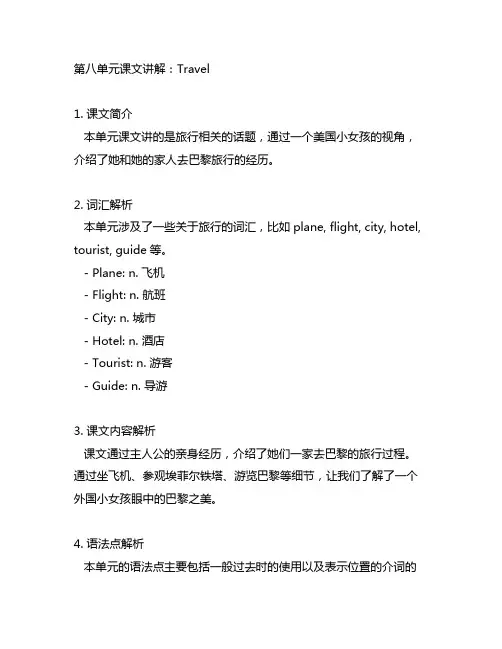
第八单元课文讲解:Travel1. 课文简介本单元课文讲的是旅行相关的话题,通过一个美国小女孩的视角,介绍了她和她的家人去巴黎旅行的经历。
2. 词汇解析本单元涉及了一些关于旅行的词汇,比如plane, flight, city, hotel, tourist, guide等。
- Plane: n. 飞机- Flight: n. 航班- City: n. 城市- Hotel: n. 酒店- Tourist: n. 游客- Guide: n. 导游3. 课文内容解析课文通过主人公的亲身经历,介绍了她们一家去巴黎的旅行过程。
通过坐飞机、参观埃菲尔铁塔、游览巴黎等细节,让我们了解了一个外国小女孩眼中的巴黎之美。
4. 语法点解析本单元的语法点主要包括一般过去时的使用以及表示位置的介词的用法。
- 一般过去时: 表示过去发生的动作或状态,常用于一些特定的时间段或事件。
- 介词的用法: 介词在句子中主要用来表示时间、地点、方向等,常见的有in, on, at, for, to等。
5. 背景知识为了更好地理解课文内容,可以了解一些有关法国、巴黎的背景知识,比如巴黎的地理位置、著名景点等。
6. 学习方法在学习本单元课文时,可以通过阅读课文、听录音、跟读、背诵等方式来提高对课文的理解和记忆。
也可以结合课外阅读,了解更多与旅行相关的知识和经验。
7. 拓展延伸除了课本上的内容,也可以通过观看相关的旅行纪录片、阅读游记等方式,来增加对于旅行的了解和体验。
通过对本单元课文的深入理解和学习,不仅可以提高自己的英语水平,还可以增加对于旅行和世界各地文化的认识和理解。
希望同学们在学习的过程中能够积极参与,多多思考,为自己的英语学习之旅增添更多精彩的色彩。
在学习旅行的课文的我们也可以了解一些其他与旅行相关的知识,比如旅行的好处、不同国家的风土人情、旅行安全常识等。
旅行可以开阔我们的视野,让我们更好地了解世界,感受不同的文化,接触不同的人群,从而促进我们的个人成长和发展。

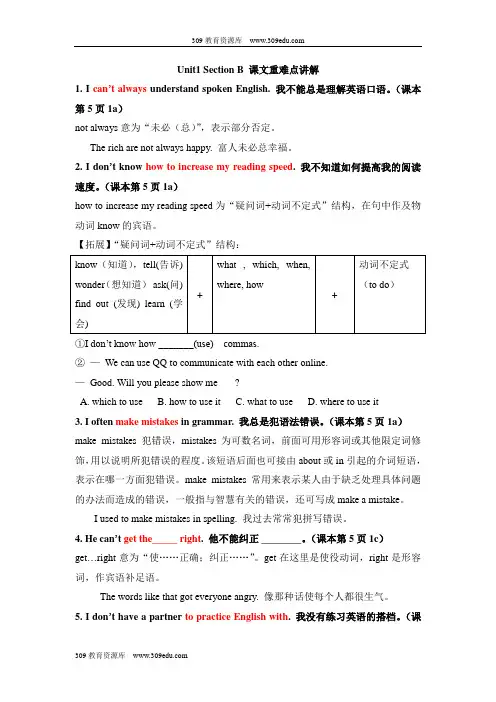
Unit1 Section B 课文重难点讲解1. I can’t always understand spoken English. 我不能总是理解英语口语。
(课本第5页1a)not always意为“未必(总)”,表示部分否定。
The rich are not always happy. 富人未必总幸福。
2. I don’t know how to increase my reading speed. 我不知道如何提高我的阅读速度。
(课本第5页1a)how to increase my reading speed为“疑问词+动词不定式”结构,在句中作及物动词know的宾语。
【拓展】“疑问词+动词不定式”结构:①I don’t know how _______(use) commas.②—We can use QQ to communicate with each other online.—Good. Will you please show me ___?A. which to useB. how to use itC. what to useD. where to use it3. I often make mistakes in grammar. 我总是犯语法错误。
(课本第5页1a)make mistakes 犯错误,mistakes为可数名词,前面可用形容词或其他限定词修饰,用以说明所犯错误的程度。
该短语后面也可接由about或in引起的介词短语,表示在哪一方面犯错误。
make mistakes常用来表示某人由于缺乏处理具体问题的办法而造成的错误,一般指与智慧有关的错误,还可写成 make a mistake。
I used to make mistakes in spelling. 我过去常常犯拼写错误。
4. He can’t get the_____ right. 他不能纠正 ________。
教师学生时间和时段2016年月日(:—:)学科英语年级九年级上教材名称人教版授课题目Unit6 When was it invented? 课次第()次课【短语归纳】1.the style of……的样式17. all of a sudden 突然;猛地2.such a great invention 如此了不起的一项发明18. by mistake 错误地;无意中3.be used for 被用于….. 19. in the end 最后4.by accident 偶然;意外地20.a cook called George Crum 一个名叫乔治·卡拉姆的厨师5.think of/ about 想/考虑21. more than 多于;超过6.fall into 落入/陷入22. the Olympics 奥林匹克运动会7.in our daily life 在我们的日常生活中23. divide…into…把…分成…8.some time 一段时间24. at the same time 同时9.the saint of tea 茶圣25. stop…from doing…阻止…做…10.less than 少于;不到26. dream of/ about 梦想;向往11.take place 发生;出现27. not only…but also…不但….而且…12.in the 19th century 在十九世纪28. the number of……的数量13.the popularity of……的普及29. more and more 越来越….14.without doubt 毫无疑问;的确30. look up to 钦佩;仰慕15.at a low price 以低价31. achieve one’s dreams 实现某人的梦想16.translate.. into.. 把..翻译成…32. take notes 记笔记33.lead to 导致【用法集萃】1. It is said that…据说…2.It is believed that…人们认为….3. ask sb. (not) to do sth. 要求某人(不要)做某事4. teach sb. to do sth. 教某人做某事5. need to do sth.需要做某事6.encourage sb. to do sth.鼓励某人做某事7. be used to do sth. 被用于做某事Section Al. I think the TV was invented before the car. 我认为电视是在小汽车之前被发明的。
P83A2a 课文参考译文一位快乐人的衬衫很久以前(a long time ago ),在一个富饶美丽的国家住着一个不快乐的国王,他睡不好觉而且也不想吃东西,他总是面色苍白如粉笔(be pale as chalk )。
他经常无缘无故地哭泣(cry for no reason )。
这使王后和他的臣民很担心。
一天,一名医生被召入宫给国王检查(examine)。
但是他发现国王身体没什么疾病。
“病根都在他的思想。
药和休息都不能帮助他。
他所需要的是一件快乐的人穿的一件衣服。
那将使他快乐起来。
”首相被召入宫,但是当他们把国王的情况解释(explain sth. to sb )给他时,他说:“虽然我有很大的权力(power ),但是它并没使我开心。
我总担心失去我的权力。
许多人想取代我的位置。
然后,国王的银行家来到宫殿。
他说:“恐怕我也不开心。
我有很多财富(wealth ),但我总担心失去我的钱。
每天有人想偷我的钱。
”后来,国王的歌唱家来到宫殿。
但是他是这样说的:“我很出名且每个人都喜欢我的歌,但我也不开心,因为我总担心被别人模仿,我不能自由。
”最后,国王的上将军被派出去在三天内(in three days ’time )找到一个快乐的人。
课文重难点讲解:1.含有un-前缀的单词:表示不.. unhappy ,unimportant.unlike ,unfair ,unreal ,unable ,unlucky ,unknown (不详). 2.long,long ago=once upon a time=a long time ago 从前,很久以前3.leave out 忽略,不提及He left out the possiblity that the train might be late. Feel left out 觉得被冷落了,觉得被遗忘了觉得被冷落了,觉得被遗忘了. When the baby feels left out ,he will try to cry to get his parents’attention. 4.feel like doing =would like to do =want to do 想要做x 事,但是也有点区别,见下表Feel like 接名词,代词,动词ing 形式(动名词)构成feel like doing sth 或者或者feel like +名词,代词名词,代词Would like 接名词,代词,动词不定式构成would like to do sth.或者would like+名词,代词.would 不受时态和人称的影响want 接名词,代词,动词不定式构成want to do sth.或者want+名词,代词e.g.I feel like going/would like to go / want to go for a walk after dinner. for a walk after dinner. Li Ping f eels feels like /would like/ wants some fish some fishfor lunch. for lunch. 5.call in ,叫来,召来be called in 被叫来,被召见. The king called the general in to the palace. Hua Tuo was called in to examine Guan Yu in the story. 6.neither …nor …既不…也不…, …和...都不连接主语时谓语动词单复数遵循就近原则。
人教版九年级英语课文讲解由于您没有指定具体是九年级英语哪一篇课文,以下我以人教版九年级英语Unit 1 How can we become good learners? Section A 3a为例来进行课文讲解:一、课文原文。
“How I Learned to Learn English”Last year, I did not like my English class. Every class was like a bad dream. The teacher spoke so quickly that I did not understand her most of the time. I was afraid to ask questions because of my poor pronunciation. I just hid behind my textbook and never said anything.Then one day I watched an English movie called Toy Story. I fell inlove with this exciting and funny movie! So I began to watch other English movies, too. Although I could not understand everything the characters said, their body language and the expressions on their faces helped me to get the meaning. I also realized I could get the meaning by listening for just the key words. My pronunciation improved as well by listening to the conversations in English movies. I discovered that listening to something interesting is the secret to language learning. I also learned useful sentences like “It’s a piece of cake” or “It serves you right.” I did not understand these sentences at first. But because I wanted to understand the story, I looked them up in a dictionary.Now I really enjoy my English class. I want to learn new words and more grammar so that I can have a better understanding of English movies.二、词汇讲解。
Unit1 Section A 课文重难点讲解1. by asking the teacher for help 通过向教师求助。
〔课本第1页1a〕by 介词,通过,靠。
表示方法、手段,其后可接名词、代词或动词-ing形式。
I memorize the new words by reading the text. 我通过读课文来记忆新单词。
拓展:◆by的用法:(1)by doing sth 通过…方式by studying with a group【注】介词短语作方式状语,答复以How开头的问句,表示“怎样做〞。
①I study English by _____(listen) to the tapes②Tom learns Chinese by ______(watch) Chinese movies.③—____ did you get there? —By ___ a taxi.A. How; takingB. How; takeC. How; tookD. What; taking(2) by+ 交通工具〔交通工具前不能加限定词〕by bike by train【by短语】by the way 顺便问一下by accident= by chance 偶然地by mistake 错误地one by one 一个接一个step by step 一步一步地little by little 逐渐地by the time 到……为止by oneself 单独地by and by 不久之后by hand 用手by the end of 到….... 末尾2. How do you study for a test?你如何为考试而学习?〔课文第1页1c〕(1) How引导的特殊疑问句用来询问“方式〞。
—How did you catch a cold?你是怎么感冒的?—By staying in the rain.;淋雨得的。